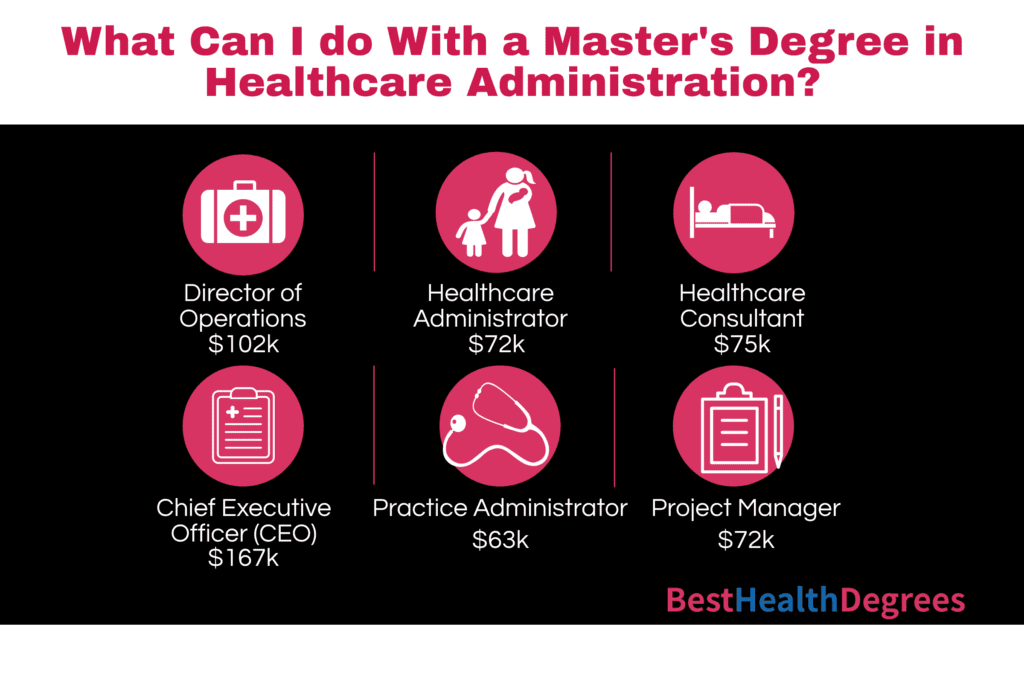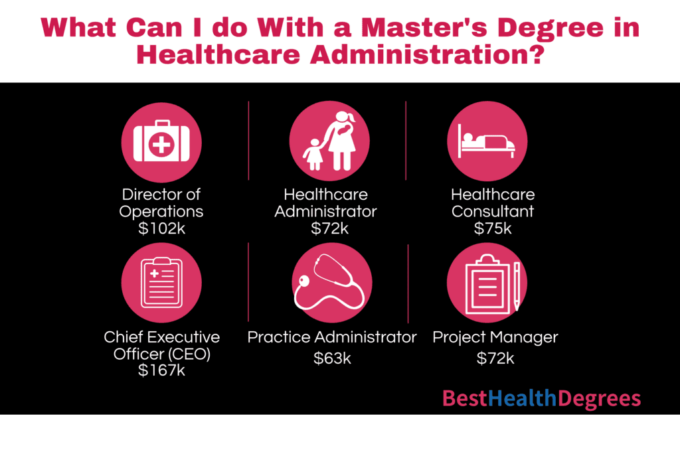
Degree Overview
A Master’s in Health Care Administration (MHA) is a graduate-level degree designed for individuals seeking leadership and management roles in the healthcare industry. The MHA curriculum provides a comprehensive understanding of healthcare systems, administration, and policy.
The typical MHA curriculum includes core courses in healthcare management, finance, marketing, human resources, and operations. Students can also specialize in areas such as health informatics, long-term care, or public health.
MHA programs are offered in various formats, including full-time, part-time, and online. Full-time programs typically take two years to complete, while part-time and online programs can take longer.
Career Opportunities
Graduates with a Master’s in Health Care Administration (MHA) embark on a promising career path in the dynamic healthcare industry. They assume multifaceted roles that contribute to the efficient operation and management of healthcare organizations.
MHA graduates can pursue diverse job titles, including:
- Hospital Administrator
- Clinic Manager
- Healthcare Consultant
- Health Insurance Executive
- Medical Practice Manager
These roles encompass responsibilities such as:
- Planning and directing healthcare operations
- Managing budgets and financial resources
- Ensuring compliance with healthcare regulations
- Developing and implementing quality improvement programs
- Advocating for patient rights and improving patient outcomes
MHA graduates are employed in various healthcare settings, including:
- Hospitals
- Clinics
- Insurance companies
- Consulting firms
- Government agencies
Skills and Knowledge Gained
Master’s in Health Care Administration (MHA) programs equip graduates with a comprehensive set of skills and knowledge essential for effective healthcare leadership.
Through rigorous coursework, practical experiences, and research, MHA graduates gain a deep understanding of the complexities of healthcare systems and the ability to navigate them successfully.
Healthcare Management
MHA graduates develop a strong foundation in healthcare management principles and practices, including strategic planning, financial management, operations management, and quality improvement.
- Understanding healthcare delivery models and payment systems
- Analyzing healthcare data to identify trends and improve outcomes
- Developing and implementing healthcare policies and procedures
Financial Management
MHA graduates acquire expertise in financial management, enabling them to effectively allocate resources, manage budgets, and ensure financial sustainability.
- Understanding healthcare accounting principles and financial reporting
- Developing and managing healthcare budgets
- Analyzing financial data to make informed decisions
Operations Management
MHA graduates develop skills in operations management, allowing them to optimize healthcare processes, improve efficiency, and enhance patient care.
- Understanding healthcare operations and workflow
- Developing and implementing operational plans
- Evaluating and improving healthcare processes
Human Resources Management
MHA graduates gain expertise in human resources management, enabling them to recruit, develop, and retain a high-performing workforce.
- Understanding healthcare human resources laws and regulations
- Developing and implementing human resources policies and procedures
- Managing employee performance and compensation
Information Technology
MHA graduates develop a solid understanding of information technology (IT) and its applications in healthcare, enabling them to leverage technology to improve patient care, efficiency, and innovation.
- Understanding healthcare IT systems and applications
- Evaluating and implementing healthcare IT solutions
- Protecting healthcare data and ensuring compliance
Program Structure and Delivery

An MHA program typically comprises three core components: coursework, practicum, and a capstone project. Coursework provides a solid foundation in healthcare administration, covering topics such as healthcare finance, operations management, human resources, and strategic planning. The practicum offers hands-on experience in a real-world healthcare setting, allowing students to apply their knowledge and skills under the guidance of experienced professionals. The capstone project is a culminating experience where students conduct independent research and present their findings on a relevant healthcare issue.
Methods of Program Delivery
MHA programs are offered through various delivery methods, each with its own advantages and drawbacks:
In-person:
In-person programs provide face-to-face instruction in a traditional classroom setting. They offer the benefit of direct interaction with faculty and peers, fostering a collaborative learning environment. However, in-person programs may require students to relocate or travel to the institution, which can be a logistical challenge for some.
Online:
Online programs offer flexibility and convenience, allowing students to complete coursework from anywhere with an internet connection. They utilize virtual learning platforms and video conferencing to deliver lectures and facilitate discussions. Online programs are well-suited for working professionals who cannot attend in-person classes. However, they may lack the same level of personal interaction and hands-on experiences as in-person programs.
Hybrid:
Hybrid programs combine elements of both in-person and online delivery. They typically involve a mix of on-campus sessions and online coursework. Hybrid programs offer a balance of flexibility and face-to-face interaction, making them suitable for students who prefer a blended learning experience.
Program Accreditation and Rankings
Accreditation is essential for MHA programs, ensuring they meet rigorous quality standards set by professional organizations. The Commission on Accreditation of Healthcare Management Education (CAHME) is the primary accrediting body for MHA programs in the United States. Accredited programs undergo a rigorous review process to demonstrate compliance with standards in areas such as curriculum, faculty, and student outcomes.
To find and compare program rankings, refer to reputable sources like U.S. News & World Report, which ranks programs based on factors like faculty resources, student selectivity, and placement success. Other ranking organizations include the Financial Times and the Princeton Review.
Tips for Choosing an Accredited and Highly-Ranked MHA Program
* Verify accreditation by CAHME.
* Consider program rankings from reputable sources.
* Research faculty credentials and experience.
* Inquire about student placement rates and employer partnerships.
* Attend program information sessions and connect with current students or alumni.
* Ensure the program aligns with your career goals and interests.
Admission Requirements and Application Process
Admission to MHA programs typically requires a strong academic background and professional experience in healthcare. Applicants should meet the following requirements:
Bachelor’s Degree
A bachelor’s degree from an accredited institution is required. Relevant fields of study include healthcare administration, public health, business, or a related field.
GPA
A minimum GPA of 3.0 on a 4.0 scale is typically required. Some programs may have higher GPA requirements.
GRE/GMAT Scores
Most MHA programs require applicants to submit GRE or GMAT scores. The required scores vary by program.
Work Experience
Many MHA programs require applicants to have at least two years of full-time work experience in healthcare administration or a related field.
Application Process
The application process typically involves the following steps:
- Submitting official transcripts from all colleges and universities attended.
- Writing personal statements that demonstrate your interest in healthcare administration and your qualifications for the program.
- Interviewing with the program admissions committee.
Financial Considerations
Earning a Master’s in Health Care Administration (MHA) is an investment in your future. Understanding the costs associated with the program and the financial aid options available can help you make an informed decision.
The total cost of an MHA program can vary depending on the institution, program duration, and location. Typically, expenses include:
Tuition and Fees
Tuition fees cover the cost of instruction, materials, and other program-related expenses. Fees may include registration, technology, and student activity fees.
Living Expenses
Living expenses include housing, food, transportation, and other personal expenses. These costs can vary significantly depending on the location of the institution and your lifestyle.
Return on Investment (ROI)
Investing in a Master’s in Health Care Administration (MHA) can yield a substantial return on investment (ROI) for graduates. The degree opens doors to career advancement, higher earning potential, and expanded leadership opportunities within the healthcare industry.
According to the Bureau of Labor Statistics, healthcare administrators earn a median annual salary of $104,280. With an MHA, graduates can expect to earn even higher salaries, as they qualify for more senior and specialized roles. Additionally, MHA graduates often experience faster career advancement than those with only a bachelor’s degree, as they possess the advanced knowledge and skills necessary for leadership positions.
Factors Affecting ROI
Several factors can influence the ROI of an MHA degree, including:
- Program quality: The reputation and accreditation of the MHA program can impact the value of the degree and the career opportunities available to graduates.
- Job market conditions: The demand for healthcare administrators can vary depending on economic conditions and industry trends. In times of high demand, MHA graduates may have more leverage in negotiating salaries and benefits.
- Individual career goals: The ROI of an MHA degree can also depend on an individual’s career aspirations. Those seeking senior leadership positions or specialized roles may find that the degree provides a greater ROI than those with more general career goals.





